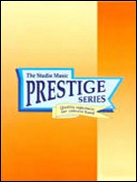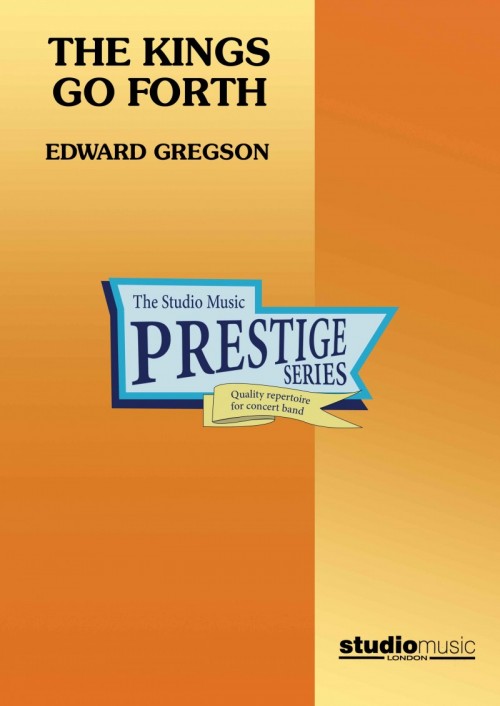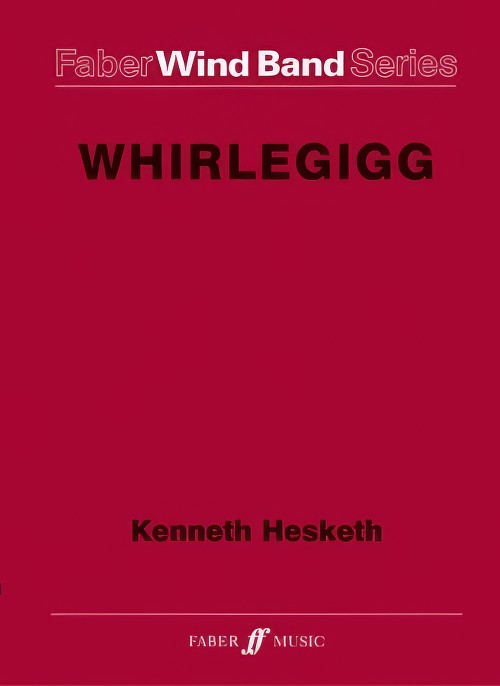Results
-
 £60.99
£60.99Soldiers Song Wind Band Set (Score & Parts)
As long as we can remember, trumpets and percussion have been the instruments most closely associated with the army and its soldiers. Just think of the medieval herald who publicly proclaimed all the king's important announcements. This work opens with a festive fanfare which immediately calls for your attention. No tidings of disaster, but a festive parade of soldiers passing by while whistling merrily. This idea was the composer's starting point when writing this cheerful little piece. 03:00
Estimated dispatch 7-14 working days
-
 £24.95
£24.95SWORD AND THE CROWN, The (Prestige Concert Band - Score only) - Gregson, Edward
Extra Score. Commissioned by Royal Air Force Music Services and based on the composer's music for the Royal Shakespeare Company. Written for large forces, the score includes harp, piano, alto flute, hand bells, descant and treble recorders, rauschpfeifen (a medieval antecedent of the oboe) and a huge battery of percussion on top of the usual wind band instrumentation (please note: no saxophones). Performance time 13'54" (Recorded on QPRM117D FESTIVAL OF MUSIC 1991, Massed Bands of the Royal Air Force - Recorded on QPRM120D THE SWORD AND THE CROWN, Central Band of the Royal Air Force - 'Finale' recorded on QPRM142D FESTIVAL OF MUSIC 2002, Massed Bands of the Royal Air Force)
Estimated dispatch 7-14 working days
-
 £164.95
£164.95The Kings Go Forth (Concert Band - Score and Parts) - Gregson, Edward
This work was commissioned jointly by the Royal Air Force Music Service and an American Universities Consortium and received its world premiere during the 1996 RAF British Tour. It is scored for large symphonic wind band, with the addition of voices.The work is a sequel to the highly successful The Sword and the Crown which was premiered in 1991 by the mass bands of the RAF (and also was an RAF commission). That work was based on music written for the Royal Shakespeare Company productions of The Plantagenets and Henry IV, parts 1 and 2 (for productions between 1988 and 1991).The Kings go Forth is similarly based on musical material for those productions. It uses different thematic elements and incorporates them into a three-movement suite entitled: The Church; The People; The State.This reflects the fact that in Henry IV Parts 1 and 2, Shakespeare introduces The People as an important element in the dramatic structure. The Church and The State are, of course, both leitmotivs throughout the entire plays. An Agnus Dei is heard at the outset from a solo voice. The ensuing Dies Irae is a fast and, at times, quite violent dance. The two sections which form the basis of the second movement, The People, concentrate on popular elements and reflect to some extent the tavern scenes in the plays. The two ideas presented are a harvest hymn reflecting the country scenes set in Gloucestershire, and a jazzy, 'up-tempo' dance based on the medieval song, Sumer is icumen in. The third movement, The State, deals with the Kings theme in the title of the piece. The juxtaposition of battle music with funeral music for Henry IV and Henry VI leads to a reworking of the leitmotif from the beginning of the work. The final section is Coronation music for Henry V, eventually leading to a triumphant climax.- Edward GregsonDuration: 17.15Recorded on QPRM 125D Festival of Music 1996, Massed Bands of the Royal Air ForceRecorded on QPRM 134D The Kings Go Forth, Royal Northern College of Music Wind Orchestra
Estimated dispatch 7-14 working days
-
 £154.99
£154.99The Robber Knight Wind Band Set (Score & Parts)
In the year 1368 a rapacious character takes up residence in the castle of Rijnesteyn at Cothen. He is Johan,bastard son of the Bishop of Utrecht.Round this now so peaceful castle eventful matters are enacted. In part one Johan and Willem Gulik of Guelders set out to do battle against King Charles of France. On their return,in part two, Johan captures two French goldsmiths in Hainault and incarcerates them at Castle Rijnesteyn. Part three is a musical representation of a courtly ballet in medieval style. The final part relates how Jan van Rijnesteyn goes to war against Hendrik van Vianen and Lord of 'Goy,Viscount of Utrecht.Jan loots his possessions and threathens to conquer all. In het jaar 1368 betrekt een roofzuchtig heerschap het kasteel Reijnestein te Cothen.Het is Johan, de bastaardzoon van de Utrechtse bisschop. Rond dit nu zo vredig gelegen ridderslot hebben zich toen geruchtmakende taferelen afgespeeld. In het eerste deel trekt Johan met Willem Gullik, de hertog van Gelre, ten strijde tegen koning Karel van Frankrijk. De terugreis speelt zich af in het tweede deel. Tijdens deze reis neemt Johan in Henegouwen twee Franse goudsmeden gevangen en sluit ze op in de kerker van slot Rijnesteyn. Deel 3 is de muzikale weergave van een hoofs ballet in middeleeuwse stijl. In het laatste deel wordt verteld hoe Jan van Rijnesteyn in 1396 ten strijde trekt tegen Hendrik van Vianen en de heer van't Goy, burggraaf van Utrecht. Jan plundert diens goederen en dreigt diens bezittingen te veroveren. 12:00
Estimated dispatch 7-14 working days
-
 £84.99
£84.99There is a land of pure delight Wind Band Set (Score & Parts)
Isaac Watts (1674-1748) wrote the lyrics of "There is a land of pure delight" and is known as the "Father of English Hymnody". Watts was for the English hymn as Ambrose was for the medieval Latin hymn and what Martin Luther was for the German chorale. He wrote about 750 songs, and some of them survide the ravahes of time. (Joy To The World, When I survey the wondrous cross, I sing the Mighty Power of God) "There is a Land of Pure Delight" is usually in English-speaking areas sung on Luther Orlando Emerson's melody ('Ascription'). Here is used a traditional English melody ('Mendip'). There is a land of pure delight Where saints immortal Reign. Infinite day excludes the night, And pleasures banish pain .. 02:45
Estimated dispatch 7-14 working days
-
 £55.00
£55.00Whirlegigg (Concert Band - Score and Parts) - Hesketh, Kenneth
Whirlegigg is the middle English word for a contraption that continuously spins. A great fascination with many inventors of the medieval period was to develop a perpetual motion machine constantly turning and giving off energy. This idea is particularly apt for this piece. A simple ternary structure gives ample opportunity for both boisterous and reflective material with gyrating accompanimental figures never far away. The machine almost stops near the end, but finally musters one last burst of excitement and energy to bring the work to its close.Duration: 5.00
Estimated dispatch 7-14 working days
-
 £87.99
£87.99Cityscape - Jan Hadermann
Cityscape was commissioned by Concertband Antwerp for the 't Stad Geblazen event, which took place during the weekend of European Heritage Days in 2024.This short concert piece describes the impressions given when approaching and visiting the beautiful Belgian city of Antwerp from the north across the river Scheldt. We first pass the busy bustle of the harbour, home to the impressive Port House. Then the old city comes into view: the graceful cathedral tower, surrounded by smaller church spires and modern buildings, dominates the distinctive skyline. After setting foot ashore, we are struck by the beautiful way the medieval buildings here blend harmoniously with modern architecture. Our walk through the city continues: we visit the serene cathedral and are impressed by the picturesque faades of and around the city hall, as well as the Brabo Fountain on the Grote Markt (Large Market Square). Finally, it is time to enjoy the merriment taking place on the many squares of the lively city centre.
Estimated dispatch 7-14 working days
-
 £187.10
£187.10Game of Thrones Main Title Theme - Ramin Djawadi
Ramin Djawadi composed the music for "Game of Thrones" and its prequel "House of Dragons" in 2011 when he was approached by the series creators David Benioff and D.B. Weiss.The main theme is an iconic piece that captures the essence of the series' epic and complex nature. The melody is simple yet powerful, with a highly recognizable line. Like much other TV series and film music, it uses a repetitive structure that creates a sense of inevitability and fate. The harmonics are complex, shifting between major and minor, contributing to the feeling of uncertainty and mystique. This arrangement's use of instruments such as taiko drums enhances the rhythmic drive of the music. The main theme has a timeless quality that makes it feel both timeless and relevant, fitting well with the series' medieval setting.
Estimated dispatch 7-14 working days
-
 £193.20
£193.20CASTRVM - Lionel Beltrán-Cecilia
CASTRVM is a symphonic episode inspired by four of the main civilizations that have coexisted over time in Ulldecona's Castle. With its melodies and sound effects, the composer tries to transport the listener through a trip to four uninterrupted movements, from the beginnings of this small settlement, creating a natural atmosphere recreated by the voice and the singing of birds to take us into the history with the first inhabitants, the Iberians, giving strength to the introduction of the composition, to move on to the time of the Andalusians, which with a melody in the form of a dance marked by percussion will transport us to take a walk in the surroundings of its circular tower. Next, and with strength, we arrive at the medieval and Christian period, marked in the score by the brass instruments, in this fragment we find moments that take us into the church of "Santa Mara de los ngeles", with melodies that evoke resonance and pomposity, continuing until we find the immense square tower, symbol of the fortress and homage, finally used as a prison and arsenal of those times. Then, there is a small slow march that will move us to some measures of strong stridency to finish with the whole section of low brass having its great moment of prominence, down to we reach the last part, Qna, a name that is recited during the musical piece and one of the names given in the past to the area that could be seen from the castle, where the change of location of the new town is recreated leaving the castle site, but always looking at it with respect and admiration as at the beginning of what is now the current Ulldecona, in this part, the composer plays a bit with a very well-known and significant melody for the inhabitants of Ulldecona, the "Jota Vieja", first making a reflex effect of all its melody and then only with the first six notes of this one, which builds a bridge until reaching the march and, later, the grand finale of this symphonic episode. The work was commissioned by Ulldecona Town Council and the Ulldecona Music Band, led by its conductor Joan Nadal i Girona, to commemorate the 800th anniversary of the donation of the Town Charter of Ulldecona "the old" (1222-2022), as part of the PATRIMONIUM 20.22 programme, "La Banda (Sonora) del Castell" (The soundtrack of the Castle).CASTRVM consists of: I.Iberians: stone and ironII.AndalusiansIII.The square tower: fortress and homageIV.Qna
Estimated dispatch 7-14 working days
-
 £115.00
£115.00The Loch - Guillaume Détrez
Somewhere in Scotland, a lake..., a thick mist that is gradually disappearing. A bird begins to fly over this one. The lake sparkles under the rays of the sun. The bird lands on a terrace of a castle bordering the lake. A party takes place there where laughter and medieval dances follow one another but a monster comes to disturb this jubilation. A battle ensues and a victory. The bird takes flight again as a finale. Wind soundDownload the wind sound needed in this composition here: download
Estimated dispatch 7-14 working days
